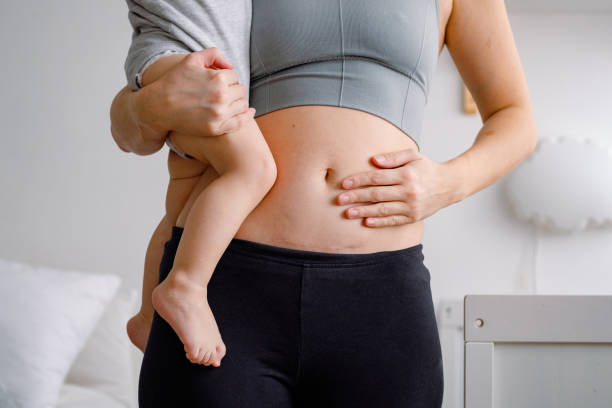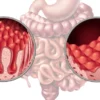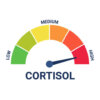
Childbirth can have an impact in many ways. On a day-to-day basis, social events, emotional health and digestive health. For some, digestive issues may be present or increase during the pregnancy, while for others, symptoms may increase shortly after giving birth.
If you’re experiencing persistent bloating, cramps, irregular bowel movements, or food sensitivities after childbirth, you might be wondering: Could this be IBS?
Postpartum IBS is often an overlooked issue. While it may not be discussed that often, it doesn’t mean it’s uncommon. Let’s take a closer look at what’s going on, why symptoms may appear after giving birth, and how you can begin to support it with care and confidence.
What Is IBS and How It Relates to Postpartum
Irritable Bowel Syndrome (IBS) is a functional gastrointestinal disorder characterised by symptoms like bloating, abdominal pain, constipation, diarrhoea, and irregular bowel habits.
In the postpartum period, your body undergoes massive physiological and hormonal shifts, which can directly impact the digestive system. Some women experience new-onset IBS-like symptoms after giving birth, while others who had IBS before pregnancy may notice a flare-up or change in their symptom pattern.
This connection isn’t surprising when you consider how closely the gut is linked to hormones, stress levels, diet, sleep, and mental health, all of which can be disrupted during postpartum recovery.
Causes of Postpartum IBS
There isn’t one single cause of postpartum IBS. Rather, it’s often the result of several overlapping factors:
· Hormonal Fluctuations: Oestrogen and progesterone drop sharply after birth, which can impact gut motility and sensitivity.
· Pelvic Floor Trauma: Vaginal delivery, episiotomies, or tears may alter nerve function or lead to changes in bowel habits.
· Changes in Routine: Disrupted sleep, erratic eating patterns, or reduced physical activity can all contribute.
· Microbiome Shifts: Antibiotics during delivery or C-section, stress, and hormonal shifts may all affect the gut microbiome.
· Psychological Stress: New parenthood can be emotionally taxing. The gut-brain axis is sensitive to stress, making symptoms worse.
· Dietary Changes: Whether it’s adjusting to breastfeeding demands or grabbing convenient snacks, diet often shifts in early motherhood, and the gut may not always approve.
Symptoms of Postpartum IBS
Postpartum IBS may mirror “classic” IBS symptoms, but many women also report subtler or new sensations they didn’t notice before childbirth.
Common symptoms include:
· Bloating or abdominal distension
· Cramping or discomfort, especially after meals
· Irregular bowel habits (diarrhoea, constipation, or alternating)
· Urgency to use the toilet
· Incomplete evacuation
· Increased gas
· Sensitivity to certain foods
· Fatigue and sleep disturbances (which may be both a cause and result of gut issues)
It’s worth noting that some of these symptoms can overlap with other postpartum issues, like haemorrhoids, pelvic floor dysfunction, or even healing from birth trauma, which is why a personalised, thorough assessment is key.
How Hormonal Changes Affect IBS After Childbirth
Hormones are central to the IBS picture, and postpartum is a time of intense hormonal flux.
· Oestrogen helps regulate pain sensitivity and immune function, both of which can influence IBS. When oestrogen levels drop after delivery, some women notice an increase in gut sensitivity or inflammatory symptoms.
· Progesterone has a known slowing effect on gut motility. During pregnancy, high progesterone levels often lead to constipation. After birth, when levels crash, some women experience the opposite effect, looser stools or more frequent urges.
· Oxytocin (the bonding and breastfeeding hormone) can indirectly affect gut function by reducing stress when in balance, but it may be overwhelmed by cortisol during sleep deprivation or emotional exhaustion.
This hormonal rollercoaster may help explain why IBS symptoms appear — or change — in the weeks and months following childbirth.
Risk Factors for Developing Postpartum IBS
While anyone can experience IBS after giving birth, some women may be more vulnerable.
Factors that increase the risk include:
· A pre-existing IBS diagnosis or history of gut sensitivity
· Traumatic birth (prolonged labour, emergency interventions, instrumental delivery)
· C-section or perinatal antibiotics, which may disrupt gut flora
· Sleep deprivation and chronic fatigue
· Postnatal depression or anxiety
· Significant dietary changes or food aversions
· Stressful postpartum environments or lack of support
Understanding your own risk factors can help guide a more proactive and compassionate approach to symptom management.
Diagnosis of Postpartum IBS
There’s no single test for IBS, whether it’s postpartum or otherwise. Diagnosis is typically based on your symptoms and the exclusion of other conditions.
Your healthcare provider may use the Rome IV criteria for IBS, which focus on:
· Recurrent abdominal pain at least once a week for the last 3 months
· Symptoms associated with defecation, a change in stool frequency, or a change in stool form
However, in postpartum women, it’s essential to rule out other possible causes, such as:
· Inflammatory bowel disease (IBD)
· Coeliac disease
· Postpartum thyroid disorders
· Pelvic floor dysfunction
· Haemorrhoids or anal fissures
Blood tests, stool tests, or even imaging may be recommended if red flags (e.g. unexplained weight loss, bleeding, anaemia) are present.
Managing Postpartum IBS: Treatment Options
Managing IBS after childbirth often involves a multifaceted approach. The aim isn’t just to reduce symptoms but also to support overall well-being in a period that can feel physically and emotionally overwhelming.
Here’s what treatment may involve:
· Nutritional Support: Identifying food triggers and ensuring regular, balanced meals.
· Probiotics: These may help restore gut flora, especially after antibiotics.
· Medication: Antispasmodics, laxatives, or anti-diarrhoeal agents may be used cautiously, especially if breastfeeding.
· Psychological Therapies: Cognitive behavioural therapy (CBT), gut-directed hypnotherapy, or mindfulness-based approaches can be incredibly beneficial.
· Pelvic Floor Physiotherapy: Especially if symptoms include bowel urgency, incontinence, or pain during bowel movements.
It’s important that your care plan takes your lifestyle and breastfeeding status into account. The goal is sustainable, gentle support, not more stress.
Dietary Adjustments and Lifestyle Changes
While your instinct might be to “fix” IBS with diet alone, it’s important to tread carefully. The postpartum period isn’t always the right time for restrictive plans, especially when energy needs are high and time is short.
That said, small, mindful changes can go a long way:
· Meal Timing: Eat regular meals and avoid skipping, which can disrupt gut motility.
· Fibre Balance: Gradually increase soluble fibre (e.g. oats, psyllium husk) to support regularity.
· Hydration: Especially if breastfeeding, aim to stay well-hydrated to help soften stools.
· Trigger Identification: Keep a food and symptom diary. Common culprits include caffeine, dairy, high-fat foods, and artificial sweeteners.
· Gentle Movement: Short walks or stretching can aid digestion and reduce bloating.
· Caffeine and Sugar: These may aggravate symptoms in some, particularly when consumed on an empty stomach.
A registered nutritional therapist trained in IBS and women’s health can help create a realistic, nourishing approach that supports both gut and postpartum recovery.
Stress and Mental Health in Postpartum IBS
It’s impossible to separate IBS from the gut-brain connection — and never is that more evident than in the emotional landscape of new motherhood.
Postpartum is a time of:
· Sleep deprivation
· Shifting identity
· Hormonal mood fluctuations
· Physical recovery
· Increased anxiety about baby’s health and feeding
All of these can strain the nervous system and, in turn, the gut. For some, IBS may be a reflection of an overloaded nervous system more than the food they eat.
Supporting mental health is just as important as managing diet. Consider:
· Postnatal therapy or counselling
· Mindfulness meditation or breathwork (even 5 minutes can help)
· Connecting with other mothers to reduce isolation
· Asking for help with baby care, meals, or emotional support
If symptoms feel overwhelming or are interfering with daily life, please know that you are not alone, and help is available.
When to Seek Medical Advice for Postpartum IBS
While occasional bloating or irregularity is normal during postpartum recovery, there are times when a professional opinion is needed.
Speak to your GP or specialist if you experience:
· Persistent abdominal pain that worsens over time
· Blood in your stool
· Significant weight loss without trying
· Fatigue that doesn’t improve with rest
· Symptoms that affect your ability to eat, sleep, or care for your baby
· Emotional distress, anxiety, or depression
Early support often leads to quicker relief and better long-term outcomes.
Conclusion
The postpartum period is one of the most transformative times in a woman’s life and your gut is very much part of that transformation. Whether you’re dealing with new symptoms or navigating changes to an existing IBS pattern, know that you’re not alone, and it’s not “just in your head.”
Postpartum IBS is real, and it deserves understanding, compassion, and proper care.
References
- PubMed Central – Postpartum Anorectal and Pelvic Floor Disorders
- Verywell Health – Bowel Problems After Childbirth
- N. Branberg PT – Is Postpartum Responsible For My Digestive Issues?
- American Journal of Gastroenterology – Pregnancy and Postpartum Bowel Changes: Constipation and Faecal Incontinence
- Orlando Health Women’s Institute – Urinary and Bowel Problems After Pregnancy: You’re Not Alone
- Medicover Hospitals – Managing Irritable Bowel Syndrome Symptoms After Pregnancy
- MDPI (Journal of Clinical Medicine) – Irritable Bowel Syndrome and the Gut Microbiome
Last Updated
Uploaded by Martin Cohen on 08/09/2025






